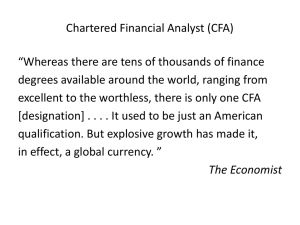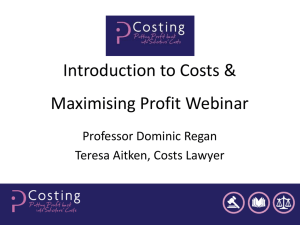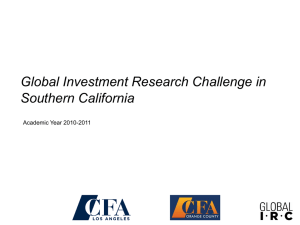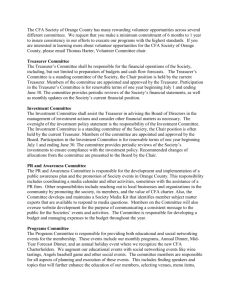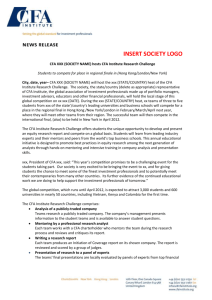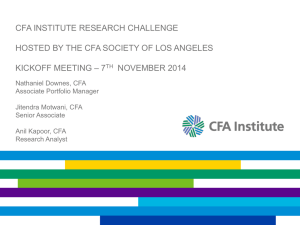Major Topics - College of Fine Arts
advertisement
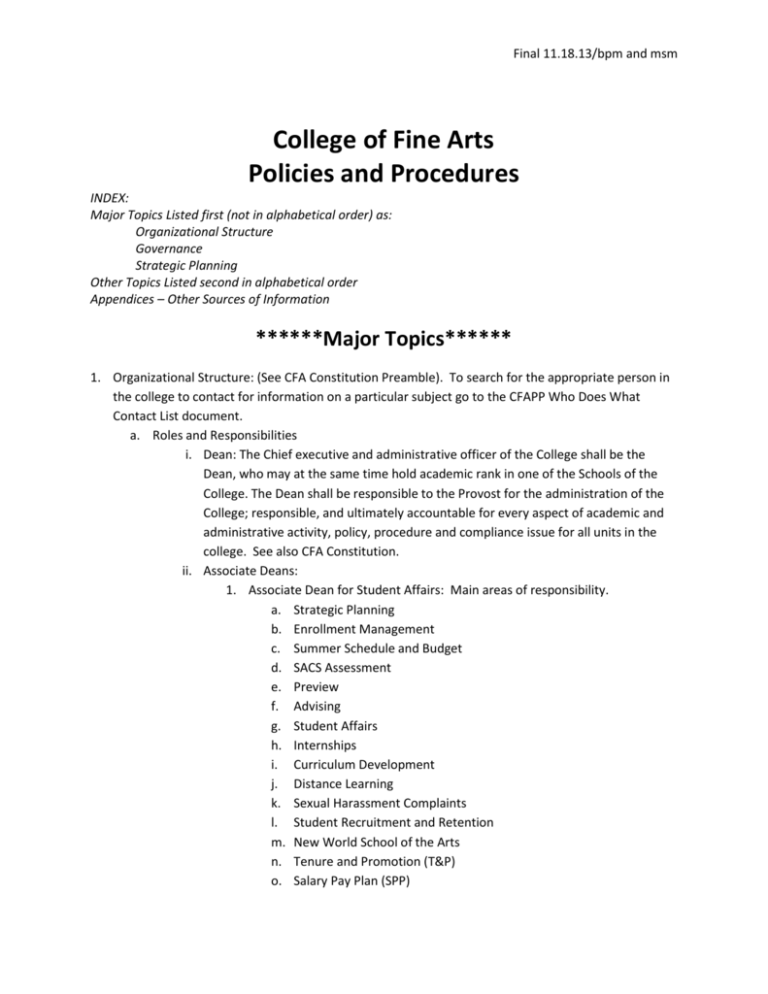
Final 11.18.13/bpm and msm College of Fine Arts Policies and Procedures INDEX: Major Topics Listed first (not in alphabetical order) as: Organizational Structure Governance Strategic Planning Other Topics Listed second in alphabetical order Appendices – Other Sources of Information ******Major Topics****** 1. Organizational Structure: (See CFA Constitution Preamble). To search for the appropriate person in the college to contact for information on a particular subject go to the CFAPP Who Does What Contact List document. a. Roles and Responsibilities i. Dean: The Chief executive and administrative officer of the College shall be the Dean, who may at the same time hold academic rank in one of the Schools of the College. The Dean shall be responsible to the Provost for the administration of the College; responsible, and ultimately accountable for every aspect of academic and administrative activity, policy, procedure and compliance issue for all units in the college. See also CFA Constitution. ii. Associate Deans: 1. Associate Dean for Student Affairs: Main areas of responsibility. a. Strategic Planning b. Enrollment Management c. Summer Schedule and Budget d. SACS Assessment e. Preview f. Advising g. Student Affairs h. Internships i. Curriculum Development j. Distance Learning k. Sexual Harassment Complaints l. Student Recruitment and Retention m. New World School of the Arts n. Tenure and Promotion (T&P) o. Salary Pay Plan (SPP) Final 11.18.13/bpm and msm p. Sustained Performance Evaluation Plan (SPEP) 2. Associate Dean for Research, Technology, and Administrative Affairs: Main areas of responsibility. a. Strategic Planning b. College Policies and Procedures c. School Bylaws d. College Constitution e. HEADS Report f. Commencement g. Effort Reporting and Tracking, h. Space Inventory i. Centers j. Research and Grants k. Faculty Programs l. Faculty Development m. College Information Technology n. Sabbaticals o. Professional Development Leave p. Faculty Awards q. Student Awards r. Assessment s. Accreditation t. Scholarship Enhancement Fund (SEF) u. Faculty Enhancement Opportunity (FEO) v. Website w. Institutional Effectiveness x. Budget y. Facilities iii. Directors of Units (Includes Schools, Centers, Institutes and Divisions) 1. Schools: The School Director is responsible for providing leadership in the unit’s areas of teaching, research, and service. This key position represents the needs and aspirations of the unit to the college and the rest of the university. The Director is also accountable for the administrative affairs; competent management of fiscal, academic and personnel affairs. a. School of Art + Art History (SAAH) Director i. Administrative Contact: SAAH Administrative Assistant and SAAH Director of Operations b. School of Music (SOM) Director: i. Administrative Contacts: SOM Administrative Assistant and SOM Director of Operations c. School of Theatre and Dance (SOTD) Director i. Administrative Contact: SOTD Administrative Assistant Final 11.18.13/bpm and msm 2. Institutes: Below is the list of current college institutes. The College Dean oversees Institute administration. a. Digital Worlds Institute (DWI): Interdisciplinary curriculum and organizational structure. Reports to the CFA Dean. i. DWI Director: ii. Administrative Contact: DWI Administrative Assistant 3. Centers: Below is the list of current college centers. The college’s Associate Dean for Research Technology and Administrative Affairs oversees CFA center administration. a. Center for the Arts in Medicine at UF (CAM); under the College of Fine Arts i. CAM Director: b. Center for the Arts & Public Policy (CAPP): under the School of Theatre + Dance i. CAPP Director: c. Center for World Arts (CWA); under the School of Theatre + Dance i. CWA Director: 4. Affiliates: Below is the list of current college affiliates. Affiliates are supervised by the School Director under which they are housed. a. University Galleries: under the School of Art + Art History. i. Gallery Director: ii. Administrative Contact: b. Bands: under the School of Music i. Band Director: ii. Administrative Contact: BAND Administrative Assistant c. Distance Learning: Specialized unit of administration that encompasses all distance learning courses in the college. Housed in the Dean’s Office, administratively. i. Director: Associate Dean for Student Affairs ii. Administrative Contact: CFA Distance Learning Coordinator 5. New World School of the Arts (Miami): New World School of the Arts was created by the Florida Legislature in 1984 as a center of excellence in the performing and visual arts. It is an educational partnership of Miami-Dade County Public Schools, Miami Dade College, and the University of Florida. Undergraduate degrees in Dance, Music, Theatre and Visual Arts are awarded through CFA. a. NWSA Provost: b. Associate Dean for Student Affairs: c. Administrative Contact: CFA Academic Services Coordinator iv. College Central Office: Includes upper administration (Deans and Associate Deans); Alumni Affairs; Public Relations; Development; Secretarial Staff; HR Office; Fiscal/Budget Office. Final 11.18.13/bpm and msm 2. Governance a. College-wide Committees: The administrative contact for general information on the committees below is the Associate Deans’ Executive Assistant i. Executive: See CFA Constitution Section V.A. ii. Advisory Budget: See CFA Committees List iii. Curriculum: See CFA Constitution Section V.C.1 iv. Research: See CFA Committees List v. Assessment: See CFA Committees List vi. Tenure & Promotion / SPP: See CFA Constitution Section V.C.2 vii. Faculty Programs (Sabbatical, Professional Development, FEO): See CFA Committees List viii. Faculty & Student Awards (Teacher Advisor/Scholar, International Educator/Student, University Scholars Program): See CFA Committees List ix. Scholarship Enhancement Fund (previous winners) / UFRF (previous winners): See CFA Committees List x. DWI Interdisciplinary Curriculum Advisory Committee: See CFA Committees List xi. Task Force for Engineering & Arts Collaboration: See CFA Committees List b. Elections and Representation i. Faculty Senate: The Associate Dean for Research, Technology and Administrative Affairs along with the Chair of the CFA Faculty Council, jointly issue the call for nominations to open Faculty Senate seats. Elections are conducted through the Faculty Senate office. See University of Florida Faculty Senate Guide to Conducting Committee Business (http://www.senate.ufl.edu/Data/Sites/20/media/resources/committeebusinessgui de.pdf ) ii. Faculty Council: See CFA Constitution Section V.B.. iii. Staff Council: The CFA Staff Council serves as a deliberative and advisory body to the Dean on matters of significant interest and importance to the staff of the College. The Council’s purpose is to encourage input of staff; serve as a direct liaison to the Dean of the College of Fine Arts regarding matters pertaining to CFA staff; maintain an effective communication link and to facilitate a closer working relationship between staff of the college. 1. See CFA Staff Council bylaws for elections and representation information 2. Administrative Contact: Dean’s Executive Secretary iv. Commencement Marshals: See CFA Committees List. v. Other university representation: The Dean may create ad hoc committees to conduct College business and may appoint or nominate representation as appropriate. 3. Strategic Planning – The Associate Deans oversee and coordinate college-wide planning, with two principal points of interaction. Working under the guidance of the Dean and the Directors, the Executive Committee manages the college’s strategic goals. Final 11.18.13/bpm and msm a. College of Fine Arts Strategic Plan 2011-2016: The Arts and Creativity in the Research University. This plan is reviewed twice each year (December and May) and updated annually (July). b. Institutional Effectiveness Documentation: The Associate Dean for Research, Technology and Administrative Affairs is responsible for annual reporting to the UF Office of Institutional Assessment on CFA institutional planning (http://assessment.aa.ufl.edu/resources ) ********Other Topics below listed in alphabetical order******** 4. Accreditation – The Associate Dean for Research, Technology and Administrative Affairs oversees the multiple accreditation activities for CFA. a. BOG – Every seven years, each degree program prepares a report for the State University System (SUS) on its profile. The call for these reports comes through the UF Provost’s Office. ( http://www.flbog.edu/ ) b. SACSCOC – Every ten years the University of Florida undergoes a comprehensive self-study process leading to reaffirmation of accreditation by the Southern Association of Colleges and Schools Commission on Colleges (SACSCOC). http://sacs.aa.ufl.edu/accreditation c. NAST – NASD – NASM – NASAD: The Schools of Art + Art History, Theatre + Dance, and Music are accredited through the National Associations of Schools of Theatre, Dance, Music and Art & Design. Every ten years, each program undergoes a comprehensive self-study process leading to reaffirmation of accreditation. School Directors are responsible for this process. d. HEADS Data Survey – The HEADS Project is designed to provide comprehensive management data on the arts in higher education. The HEADS Project, officially established in 1982, is a statistics system that compiles and reports data from member and non-member institutions. Compiled data is published annually in the form of HEADS Data Summaries. Participation in the project is mandatory for institutional members of the National Association of Schools of Music, the National Association of Schools of Art and Design, the National Association of Schools of Theatre, and the National Association of Schools of Dance. The Data Survey form for degree-granting units requests statistical information on a number of areas including enrollment, degrees offered, operational budgets, faculty salaries, ethnic breakdown of faculty and students, and so forth 5. Assessment (Institutional) – The Associate Dean for Research, Technology and Administrative Affairs oversees CFA Institutional Assessment processes, including development of comprehensive assessment at the program and unit levels, with a special focus on assessment of student learning outcomes for undergraduate, graduate, professional, and certificate programs. (http://assessment.aa.ufl.edu/home.aspx ) a. Academic Assessment Plans (all certificate and degree programs) b. Student Learning Outcomes c. Data collection and reporting (annual) Final 11.18.13/bpm and msm 6. Compliance (legal, financial, institutional): Compliance, in this context, is intended to mean the appropriate process, procedure and communications that must be in place for any activity performed as an employee of the University of Florida, according to: a. UF Rules and Regulations (http://regulations.ufl.edu/) b. the UF Constitution (http://www.generalcounsel.ufl.edu/downloads/Constitution.pdf) and c. Senate Bylaws (http://www.generalcounsel.ufl.edu/downloads/Bylaws.pdf) d. the Faculty Union Agreement (http://www.hr.ufl.edu/labor-relations/union.asp#uff) e. the Graduate Assistant Union Agreement (http://www.hr.ufl.edu/laborrelations/forms/GAU_contract_11_14.pdf) f. the CFA Constitution g. and any other appropriate governing documents i. For questions regarding compliance on any topic not specified herein, please first contact the unit Director. 7. Curriculum a. Degree approval: Instructions on how to submit a request for the approval of the creation of a new degree can be found on the Academic Approvals Website: http://approval.ufl.edu/. For assistance with this process, please contact the CFA Academic Coordinator b. Course approval: Instructions on how to submit a request for the creation of a new course (or to make changes to an existing course) can be found on the Academic Approvals Website: http://approval.ufl.edu/. For assistance with this process, please contact the CFA Academic Coordinator. c. Fees i. Distance learning ii. Material and supplies iii. Equipment d. Auxiliary (self-funded): Any course or program run as auxiliary (self-funded) must be approved by the college and the university’s self-funded workgroup. Information and appropriate forms can be found at http://tnt.aa.ufl.edu/approval-process--college-creditdistance-online-programs.aspx and http://fora.aa.ufl.edu/Admin/EditGroup/55. For assistance, contact the Associate Dean for Academic Affairs. e. Summer sessions: Summer session planning is coordinated through the Associate dean for Academic Affairs. The planning process is initiated in early January and completed before summer registration begins in early March. f. Advising/Coordination: Each school has its own individual Undergraduate Academic Advisor. See the CFAPP Who Does What Contact List document for contact info. i. In the absence of an advisor, the CFA Academic Coordinator may be able to assist with basic advising questions for each school. 8. Development and Alumni Affairs – a. This area of the CFA is managed by the Director of Development b. The Office of Development in the College of Fine Arts includes development through individual, foundation, corporate and other fundraising working with the University of Florida Final 11.18.13/bpm and msm under their guidelines, policies and procedures. Link to UF Foundation: https://www.uff.ufl.edu/AboutTheFoundation/ c. This office also includes marketing and public relations for the College and Alumni Affairs promoting annual giving, alumni engagement and promotion. UF College of Fine Arts Development Office believes that an integrated approach to planning and development – one that connects the expertise and enthusiasm of faculty, staff, and administrators with the skills and resources of development staff – represents our best strategy for fund raising. The Office of Development works to support the identified priorities of the College with the Dean and the Schools and Centers with their Directors. Please link to the Guide for Fundraising for Faculty and Staff below. 9. Diversity and Affirmative Action Plans a. Pursuant to Executive Order 11246, the University of Florida Affirmative Action Plan for Minorities and Women demonstrates the University’s commitment to ensuring equal employment opportunity to applicants and employees regardless of race, color, religion, sex, or national origin. The University provides a working and learning environment free of discrimination or harassment on the basis of these protected statuses, as well as creed, age, disability, veteran status, gender identity and expression, genetic information, political opinions or affiliations, marital status, sexual orientation, or any other characteristic protected by law. Pursuant to Section 503 of the Rehabilitation Act of 1973 and the Vietnam Era Veterans Readjustment Assistance Act of 1974 (as amended) the University of Florida also prepares an Affirmative Action Plan for Individuals with Disabilities and Protected Veterans. b. In addition to fulfilling legal requirements, the University’s Affirmative Action Plans reaffirm our commitment to the principle of equal opportunity. The Plans are designed to assist in the review and evaluation of hiring practices, and to ensure a diverse workforce. Please refer to Tabs 1, 2, and 3 of the Minorities and Women plan for data specific to your area. c. As indicated in the Affirmative Action Plan summary, your office has been designated as a place where this document may be accessed by University of Florida employees. You will be able to access these plans using the following link: https://share.hr.ufl.edu/EquityAndDiversity/. 10. Effort Reporting: Faculty and staff conduct research, instruction, clinical activities, extension and service for UF. UF expects its faculty and staff to calculate their total UF effort, including teaching, research, extension, and service, and to align this activity with their compensation received from the University. a. The effort reporting process begins with the unit Director and administrative contact, creating a Faculty Assignment Report (FAR) prior to the semester in the Online Effort Tracking system and requesting the employee certify this report. After the semester ends actual effort is pulled from UF’s grants commitment tracking module and the UF Instructor Workload system. Unit level contacts are required to adjust as appropriate and send to the employee for certification. i. Unit Level Contacts for FARs, Instructor Workload and Effort Reporting are as follows: 1. SAAH: FARs and Effort: SAAH Director of Operations; Instructor Workload: SAAH Undergraduate Program Assistant 2. SOM: All: SOM Director of Operations Final 11.18.13/bpm and msm 3. SOTD: All: SOTD Secretary ii. College level oversight/coordination contact is the Associate Deans’ Executive Assistant iii. See also http://www.hr.ufl.edu/training/myufl/toolkits/EffortReporting.asp for training and instruction guides for this process 11. Emergency Procedures a. Behavioral/Persons Emergencies: Behavior that threatens the individual her or himself or others i. If immediate: Call 911 and report your call to the unit Director and Administrator ii. If not immediate: Report the details of the behavior to the unit Director and Administrator and follow their guidance. b. Building Emergencies: Fire Drills are usually conducted each semester by the university and the Alachua County Fire Department. Staff will be notified that the drill will be conducted during a particular week (no specific day) i. When the alarm sounds, stop what you are doing, gather purse, umbrella or any medicine you may need and exit the building. Proceed to the rally point shown on the map below. Please do not lock offices, as the Fire Department will need to check for occupants. EVACUATION RALLY POINTS Primary Location: outside Little Hall across Stadium Rd. from FAA. Secondary Location: median NE corner 13th St. & Inner Rd. Final 11.18.13/bpm and msm 12. Environmental Health & Safety Issues a. Health Assessment Exams (pre-employment and continued): CFA HR Coordinator oversees and follows up annual to make sure all CFA Staff and Faculty are up to date. b. Workers Compensation/Injury on the Job Procedures: i. Immediately upon injury, call UF’s worker’s comp office at 352-392-4940 ii. After following the UF’s worker’s comp guidance, report the injury and what UF worker’s comp advised to the Unit Director, Administrator and CFA HR Coordinator or Assistant 13. Evaluation Process and Criteria: a. Faculty: Faculty annual evaluations are governed by the collective bargaining agreement (if the faculty member is in-unit*), unit by-laws, college policies and/or university regulations. i. *”In-Unit” faculty is a status that indicates that position and person filling that position is covered under the Collective Bargaining Agreement (CBA http://www.hr.ufl.edu/labor-relations/union.asp#uff ). “Out-of-Unit” simply indicates the faculty member is not covered by the CBA but the UF rules and regulations. 1. 4 Positions in the CFA are Out-of-Unit: a. Dean b. Associate Dean (2) Final 11.18.13/bpm and msm c. CFA Graduate Program Director ii. For questions in this area contact the position supervisor or the CFA HR Coordinator iii. See also the CFA Constitution Section VI; UF HR website http://hr.ufl.edu/academic/review.asp; the faculty collective bargaining agreement; UF Rules and Regulations and unit by-laws iv. Tenure and Promotion: 1. The entire process is now online, except for the mailing of the packet to the external evaluators. For access to this online module and all administrative questions regarding Tenure and Promotion, please contact the Associate Dean’s Executive Assistant 2. Timeline: The Tenure and Promotion cycle runs from April to June of the following year. a. Tenure-accruing faculty must start the process of Tenure and Promotion in April of their sixth year or earlier, if they feel they are ready. b. In the fall semester of the cycle, faculty packets are uploaded to the online site, reviewed and voted on by their respective schools, then the College Tenure and Promotion Committee reviews and votes on the merits of the packet, as well. c. The Dean reviews the packet and writes a letter of assessment. d. After the Dean’s letter is uploaded, the packet is finalized and goes to the Academic Personnel Board (APB), the President and the Board of Trustees for review. e. Final decisions are usually received in the Dean’s Office by mid-June. b. Staff (TEAMS, USPS and Temporary (OPS) Employees) i. OPS Employees are UF’s term for Temporary Employees: In a few cases, the college may have critical positions filled on a more long term basis as OPS. UF does not require annual evaluations for OPS employees but the CFA requires annual evaluations for long-term OPS employees who work consistently over 20 hours a week for the college. These employees shall be evaluated using the TEAMS hourly evaluation process (see below). ii. TEAMS and USPS Employees: The CFA HR Coordinator notifies supervisors and employees and manages the entire annual review process. 1. The annual review for all staff must be completed and signed by supervisor and employee by March 31st of every year. 2. The CFA HR Coordinator begins the notification and management process in mid to late February of every year. iii. For questions in this area contact the position supervisor or the CFA HR Coordinator 14. Faculty Programs: The Associate Dean for Research, Technology and Administrative Affairs, oversees all competitive faculty award programs. The Associate Deans’ Executive Assistant is the primary contact for information, guidelines, timeline and application processes. Faculty Programs include: Final 11.18.13/bpm and msm a. Sabbaticals and Professional Development Leave b. Faculty Enhancement Opportunity grants (FEO) c. Scholarship Enhancement Funds (SEF) d. Academy of Distinguished Teaching Scholars e. Distinguished Alumni Professor Award (Development) f. Distinguished Professor g. Doctoral Mentoring Award (Laura Robertson) h. Dunlevie Honors Term Professorship Endowment i. Excellence Awards for Assistant Professors j. International Educator Award k. Postdoc Mentoring Award (Laura Robertson) l. Opportunity Research Seed Fund m. Salary Pay Plan for Professors (SPP) n. Teacher/Advisor of the Year o. Teacher/Scholar of the Year p. UF Research Foundation Professorship q. Others as they emerge. 15. Fiscal/Business Affairs: a. For the SAAH, SOM and SOTD: The CFA Business Office handles all Budget/Accounting, Purchasing and Payables actions for the SAAH, SOM and SOTD, with oversight by the Associate Dean for Research, Administrative Affairs, Technology and Faculty Programs and the Dean. Contact the CFA Business Manager or CFA Accounting Coordinator for information and assistance on these areas for these three schools. i. Budget/Accounting ii. Purchasing iii. Vendors/Contracts iv. Rental/Use of Facilities and Equipment v. Travel (see #21 below) b. For Band: The Band Admin Assistant handles all Budget/Accounting, Purchasing and Payables actions for Band activities, with oversight by the CFA Business Office, Associate Dean and Dean. Contact the Band Admin Assistant or CFA Business Manager for information and assistance in these areas. c. For University Gallery: The Public Art Coordinator handles all Budget/Accounting, Purchasing and Payables actions for University Gallery, with oversight by the CFA Business Office, Associate Dean and Dean. Contact the Public Art Coordinator or CFA Business Manager for information and assistance in these areas. d. For Digital Worlds Institute: The Digital Worlds Institute Administrative Assistant handles all Budget/Accounting, Purchasing and Payables actions for Digital Worlds, with oversight by the CFA Business Office, Associate Dean and Dean. Contact the DWI Administrative Assistant or CFA Business Manager for information and assistance in these areas. Final 11.18.13/bpm and msm 16. Identity/Branding The Director of Web Services / Senior Graphic Designer is responsible for creation and oversight of the College of Fine Arts identity, as well as usage and compliance of identity materials with University policy. The Public Relations and Marketing Manager is responsible for print usage and dissemination of identity materials. a. Creation of new identity materials: social media avatars, variations of existing identity materials for a School, Center or other affiliation, etc. b. Brand guidelines and/or style guides. c. Web usage and compliance of identity with University policy. d. Print usage and compliance with University policy. e. Requests print/web versions of identity materials 17. Personnel (HR) Issues: a. For the SAAH, SOM and SOTD: The CFA HR Office handles all personnel and payroll actions for the SAAH, SOM and SOTD. Contact the CFA HR Coordinator or the CFA HR Assistant for information on any personnel actions for these three schools. i. Guest Artist/Performers/Speakers/Visitors/Honoraria: same process as below (Hiring/Paying Personnel) ii. Hiring/Paying Personnel: If a payment needs to be issued to an individual (even as an independent contractor or a lump sum payment) for services performed for the CFA, first complete an Individual Payment Information Form (IPIF) –. Contact the CFA HR Coordinator or the CFA HR Assistant for further information and assistance. 1. No one is allowed to begin work for the CFA prior to receiving an email from the CFA HR Office specifically allowing the person to begin work. a. The Federal government requires that UF review all I-9 employment eligibility documents (social security card, photo ID and/or passport and other docs) prior to the employment start date. 2. The IPIF should be received 4-6 weeks in advance of the desired start date for the person to be paid in a timely manner. iii. Leave (Sick, Annual, Administrative, etc.): Very different rules/regulations apply between different employee types so please 1. Contact the CFA HR Coordinator or CFA HR Assistant iv. Payroll and Time Worked: Contact the CFA HR Assistant if you have questions about your paycheck or how to enter time worked or leave taken. 1. Instructions for enter and approving time worked and leave taken for all types of employees can also be found at http://www.hr.ufl.edu/training/myUFL/toolkits/timeandlabor.asp v. Searches/Vacancies: All vacancies for faculty or staff positions (other than OPS/Temporary employee positions) require a minimum 7 day search (14 days for faculty) or a Search Waiver approved by the Dean and Provost. 1. The College of Fine Arts at The University of Florida is an equal opportunity institution dedicated to building a broadly diverse and inclusive faculty and Final 11.18.13/bpm and msm staff. The college makes thorough efforts, in every search, to find candidates of all races, ethnicities, genders, backgrounds, experiences, perspectives and those who practice conduct of inclusion. a. The CFA HR Coordinator is the college’s Equal Employment Opportunity Officer (EEO) and serves as an ex-officio member of every college search committee. 2. For information and assistance on initiating a search or search waiver, contact the CFA HR Coordinator. vi. Visas/International Visitors/payments: All CFA activity with persons on visas should be run through the CFA HR Office. 1. Contact the CFA HR Coordinator as soon as you know you will be bringing someone to UF (paid or unpaid) who is not a citizen or permanent resident of the US. b. For Band: The Band Secretary handles all personnel and payroll actions for the Band division of the School of Music. Please contact him/her for information and assistance in this area. c. For University Gallery: The Public Art Coordinator handles all personnel and payroll actions for the University Gallery division of the School of Art + Art History. Please contact him/her for information and assistance in this area. d. For Digital Worlds Institute: The DWI Administrative Assistant handles all personnel and payroll actions for the Digital Worlds Institute. Please contact him/her for information and assistance in this area. 18. Privacy and Security a. General UF Privacy Policies i. Computer Privacy and Security Issues (Contact the CFA IT Office http://www.arts.ufl.edu/help or call the CFA help desk at 352-6793) and refer to the following web links for more information; 1. http://privacy.ufl.edu/privacy-policies-and-procedures/ 2. http://security.ufl.edu/ 3. http://www.it.ufl.edu/policies/ 4. http://www.arts.ufl.edu/help/policies.asp 5. http://www.it.ufl.edu/policies/acceptable-use-2/summary/ ii. Social Media Privacy Issues. The University of Florida Social Media Use Guidelines are applicable to all employees and students of the university. The guidelines also apply to other people (such as volunteers and appointees) who use internally managed university computing resources. The guidelines apply to all forms of social media, such as Facebook, Twitter, blogs, YouTube, Flickr, text messages, and other, less-popular platforms, as well as those not in existence at the time of the adoption of these guidelines. Please see the University of Florida Office of Human Resources guidelines and policies at: http://hr.ufl.edu/emp_relations/policy/social_media.asp iii. Contact the CFA Senior Information Specialist and see http://privacy.ufl.edu/privacy-policies-and-procedures/ Final 11.18.13/bpm and msm iv. Protected Information, e.g. social security numbers: Contact CFA HR office and see http://privacy.health.ufl.edu/SocSecNos/index.shtml v. FERPA information: Contact the CFA Academic Coordinator and see http://www.registrar.ufl.edu/ferpa.html b. Security Roles i.e., access to UF systems/software/peoplesoft i. Peoplesoft Security Roles: The CFA HR Coordinator is the College “Department Security Administrator (DSA)”. Email your security role request to him/her. ii. Gatorlink Account/UFID: The CFA HR Coordinator assigns UFID numbers to anyone who needs them. The staff/faculty member requesting the UFID number needs to send an email to the CFA HR Coordinator with the following information and a UFID# will be sent via email to the requestor and UFID recipient explaining how to use the UFID number to create a gatorlink account. 1. Full Legal Name (as it appears on the social security card) 2. Date of Birth 3. Country of Citizenship 4. Email address iii. Sakai: 1. Anyone who has a UFID and gatorlink account has access. 2. To get added to a particular course/site roster, you must contact the Instructor of Record for that course. iv. Student Records/ISIS: For those needing access to Student Records/ISIS, the CFA Academic Coordinator is the “Student Records Access Coordinator”. E-mail your need for access to him/her. 19. Publicity, Marketing and Community Engagement The Public Relations and Marketing Manager for the College of Fine Arts is responsible for media relations, social media, graphic design, marketing, advertising and publicity. a. Student recruitment: The Public Relations and Marketing Manager works with Associate Dean for Academic Affairs, school directors, and advisors on recruitment initiatives. b. College publications: Public Relations oversees the creation, content, design and production of College of Fine Arts publications, including an annual calendar of events (printed in September) and the annual Muse Magazine. Contact Public Relations for assistance with press engagement, design, copywriting, and social media. Story ideas and media updates should be sent to news@arts.ufl.edu. c. Performance/Exhibition: The Public Relations department oversees community engagement for 300+ performances, exhibits, events and concerts. The mission is to elevate our faculty, students, schools and institutes through the arts and cultural engagement. We manage messaging for press coverage, University engagement, and community interaction. d. Special Events: The Development Department oversees special events for fundraising and alumni engagement. The Friends of Music and Friends of Theatre + Dance host an annual fundraiser called “Splendor” at the McGuire Pavilion. 20. Research The Associate Dean for Research, Technology and Administrative Affairs is the college liaison to the Final 11.18.13/bpm and msm UF Office of Research (http://research.ufl.edu/) and is responsible for managing the research efforts of the college. a. Institutional grants: The Associate Dean for Research coordinates collaborative efforts among the schools and colleges to develop grant proposals that meet strategic goals for CFA as a whole, primarily through the National Endowment for the Arts and major foundations that support the arts. b. Faculty and Student Support: The Associate Dean for Research is available for advice and consultation for CFA faculty and students writing individual grants to pursue their own creative research. c. Standards : The Associate Dean for Research, Technology and Admin Affairs facilitates the work of the CFA Research Committee (see section 2.a.iv); which advises the Deans on matters related to the support and advancement of artistic inquiry, creative and academic research across CFA. 21. Student Affairs a. Undergraduate Affairs: The CFA Academic Coordinator is able to assist with any academic or student services related issue regarding CFA Undergraduate students. This includes, but is not limited to, University policy and procedure regarding academic issues, legal issues (university and college liability/law suits), medical issues (student illness or injury), student conduct and conflict resolution, student grades appeals, University petitions, course scheduling, course grading, course registration, instructor workload, faculty evaluations, student financial affairs, student admissions, student registration, etc. b. Graduate Programs: The CFA Graduate Program Director and Assistant Director for Distance Education are able to assist with any academic or student services related issue regarding CFA graduate students. This includes, but is not limited to, University policy and procedure regarding academic issues, legal issues (university and college liability/law suits), medical issues (student illness or injury), student conduct and conflict resolution, student grades appeals, University petitions, course scheduling, course grading, course registration, instructor workload, faculty evaluations, student financial affairs, student admissions, student registration, etc. c. Student Activities i. Under 18 Office of Youth Conferences: Numerous fingerprinting/background check requirements mandated by state/federal law now exist ANYTIME someone under the age of 18 is brought to UF campus for any number of defined activities. 1. If UF will be in any way hosting anyone under the age of 18, contact the CFA HR Coordinator (contact link) for assistance in compliance with these new requirements. 2. Details also at the Office of Youth Conferences Website https://oycs.ufsa.ufl.edu/ 22. Technology a. Systems support (hardware, software) i. Web request submitted via the helpdesk website (http://www.arts.ufl.edu/help) ii. Help desk phone/voice mail request (392-6793) Final 11.18.13/bpm and msm b. CFA Technology policies and procedures (http://www.arts.ufl.edu/help/policies.asp) – currently under edit/review to bring to current c. Web Services (Design, Development, Maintenance of all web resources), contact Tom Reno, Director of Web Services 392-6792 treno@arts.ufl.edu 23. Travel a. Student Travel It is the responsibility of the Dean/Director/Department Head to award travel funds for students. It is the responsibility of the CFA Business Office to manage the budgets of awarded funding. When a student is awarded travel, the student should contact their school liaison to determine the department policies for travel. The students should follow all CFA and department travel procedures. Upon completion of the travel the student should contact the CFA Business Manager to complete their travel reimbursement. b. Faculty and Staff It is the responsibility of the Dean/Director/Department Head to award travel funds and it is the responsibility of the CFA Business Office to manage the budgets of awarded funding. All faculty who request funding in a given year must submit a request to their School Director following his/her guidelines for requests. Faculty members who do not receive full funding may seek assistance from other sources. This must be coordinated with the School Director, and Assistant Dean for Research (if applicable). It is recommended that faculty members keep all records, as non-funded travel expenses may be eligible as tax deductions. A CFA Travel Authorization Request Worksheet must be completed and filed with the CFA Business Office at least two weeks (2) prior to traveling. In addition to facilitating payment, these forms are required for insurance purposes, and may also be helpful to faculty with respect to tax deductions. The College will not be responsible for payment of any travel that occurs outside of these guidelines. Travel where only mileage is reimbursed still requires a travel authorization prior to the travel. School Directors will submit detail travel budgets, including funding sources, to the CFA Business Office once funding is awarded. Note: If the travel requested is not on the approved Director’s budget, an email will be sent to the respective Director asking for an adjusted travel budget. Final 11.18.13/bpm and msm When using a UF P-card to pay for travel arrangements, a CFA Travel Authorization Request Worksheet is required. The authorization is used to reconcile the actual pcard transactions in PeopleSoft. P-Card holders are permitted to make their own arrangements using their p-card to pay. The signed p-card receipt must be submitted within three days as required by UF P-card policy. If the department’s Director of Operations (or any other departmental staff member) will be paying for the travel expense, arrangements must be made with them (using department’s policies). In that event the cardholder is required to submit a signed pcard receipt within three days to the business office. The CFA Business Manager (or another fiscal business officer staff member if she is unavailable) is also available to pay for travel arrangements. If you use the department’s Director of Operations or the CFA Business Manager, please use either of the following procedures: i. Contact World Class Travel at 352-371-3100 (they are the authorized University travel agent). Have World Class hold the reservation(s) and contact either your department p-card holder or the CFA Business Manager. ii. Use an online booking website (priceline.com etc.) and SAVE the itinerary. Then call the CFA Business Manager or your department p-card holder and give them your account name, password, and itinerary number. They will then be able to book the itinerary using their p-card. When paying out of pocket and waiting for reimbursement, the traveler is free to make their own travel arrangements following UF travel guidelines. UF currently does not allow for personal reimbursement for “trip insurance” (for example, paying $75 to make your trip refundable if you cancel it) so make sure you ask for an itemized receipt to turn in. Upon completion of the travel, all original receipts should be submitted to the CFA Business Office within 5 days after returning to Gainesville. The receipts should be delivered to FAA114 or the traveler can scan and email/upload the receipts to their travel authorization form for the fastest processing. If the traveler cancels their trip, they should contact the CFA Business Office immediately. REMINDER: Travel taken without following these guidelines is considered unauthorized travel and may not be reimbursable. It is for your own protection that these forms be signed and submitted well in advance of the trip to properly Final 11.18.13/bpm and msm activate insurance coverage and to ensure the travel is justified to the satisfaction of the comptroller for audit purposes. ********Appendices – Other Sources of Information******** University of Florida Handbook for Chairs & Directors Schools/Institute Handbooks College of Fine Arts Constitution University of Florida Collective Bargaining Agreement University of Florida Rules and Regulations CFAPP Who Does What Contact List document
